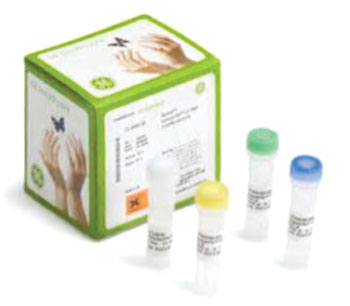DNA Amplification Kit Enables Investigation of the Genome from a Single Cell
By LabMedica International staff writers
Posted on 09 Sep 2014
A newly released DNA amplification kit enables biotech and other life science researchers to accurately and reproducibly amplify and investigate genomic DNA from single cells.Posted on 09 Sep 2014
At very low levels of input DNA, successful amplification relies on reagent quality. The new The illustra Single Cell GenomiPhi DNA amplification kit from GE Healthcare Life Sciences (Little Chalfont, United Kingdom) was developed with this in mind. The kit utilizes simple isothermal strand displacement (MDA) technology using Phi29 DNA polymerase. Lysis reagents were optimized to fully release genomic DNA from the cell and subsequently denature the DNA to enable optimal amplification and coverage. Background amplification was suppressed throughout the incubation step so that only input DNA was amplified.

Image: The illustra Single Cell GenomiPhi DNA amplification kit (Photo courtesy of GE Healthcare Life Sciences).
High quality reagents and an optional, proprietary enzymatic clean-up step in the protocol ensure that any potential DNA contaminants introduced during set-up are removed before each individual reaction. In addition, manufacturing processes, including UV and enzymatic reagent cleanup, help to ensure that all kits are free from any detectable DNA contamination.
Single Cell GenomiPhi offers a simple two-step workflow for whole genome amplification. The amplification process is two to four hours depending on the amount of starting DNA and yields of four to seven micrograms can be achieved.
Amplification is highly uniform over the entire genome so that locus representation remains extremely close to the original DNA sample. Furthermore, amplification is carried out with very high fidelity due to Phi29 DNA polymerase proofreading activity. DNA from single cells can be reproducibly and reliably amplified for use in many downstream applications.
Related Links:
GE Healthcare Life Sciences













